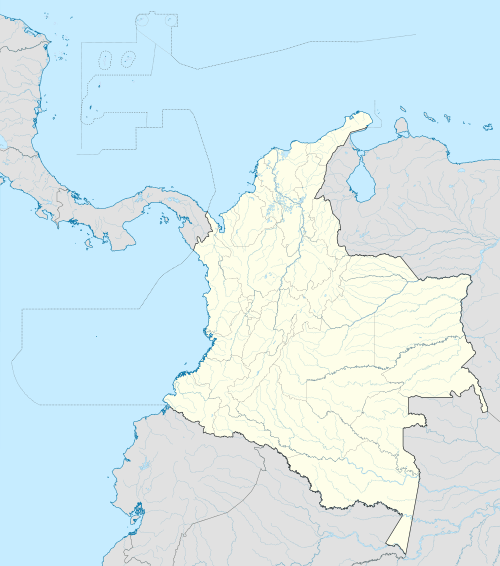Ubaté
| Ubaté | |||
|---|---|---|---|
| Municipality and town | |||
|
View of Ubaté | |||
| |||
 Location of the municipality and town inside Cundinamarca Department of Colombia | |||
 Ubaté Location in Colombia | |||
| Coordinates: 5°18′26″N 73°48′52″W / 5.30722°N 73.81444°WCoordinates: 5°18′26″N 73°48′52″W / 5.30722°N 73.81444°W | |||
| Country |
| ||
| Department |
| ||
| Province | Ubaté Province | ||
| Founded | 12 April 1592 | ||
| Founded by | Bernardo de Albornoz | ||
| Government | |||
| • Mayor |
Edgar Jairo Marquez Carrillo (2016-2019) | ||
| Area | |||
| • Municipality and town | 102 km2 (39 sq mi) | ||
| • Urban | 4 km2 (2 sq mi) | ||
| Elevation | 2,556 m (8,386 ft) | ||
| Population (2015) | |||
| • Municipality and town | 38,809 | ||
| • Density | 380/km2 (990/sq mi) | ||
| • Urban | 25,141 | ||
| Time zone | Colombia Standard Time (UTC-5) | ||
| Website | Official website | ||
Ubaté (originally Villa San Diego de Ubaté) is a town and municipality in the Ubaté Province, part of Cundinamarca Department, Colombia. Ubaté is the capital of the province with the same name and situated in the Ubaté-Chiquinquirá Valley of the Altiplano Cundiboyacense. The urban centre is located at an altitude of 2,556 metres (8,386 ft) and 97 kilometres (60 mi) from the capital Bogotá. The municipality borders the department of Boyacá in the north, the Rionegro Province in the west, the Central Savanna Province in the south and in the east and southeast the Almeidas Province.[1]
Etymology
The name Ubaté comes from the native name "Ebate" meaning "Bloodied land" or "Sower of the mouth".[1]
History
The area of Ubaté before the Spanish conquest was inhabited by the Muisca, organised in a loose confederation of rulers; the Muisca Confederation. Initially loyal to the zaque of Hunza, Ubaté changed rule around 1490 when it was submitted by zipa Saguamanchica.[2]
Modern Ubaté was founded on April 12, 1592 by Bernardo de Albornoz.[1]
It is known as the "Milk Capital of Colombia" and for a Gothic style cathedral and the San Luis Convent.
Economy
Main activities of Ubaté are agriculture and livestock farming.[1]
Gallery
- Church of Ubaté
 Church
Church- Church interior
- Church altar
References
Bibliography
- Restrepo Arcila, Roberto Arturo (2002). Sabiduría, poder y comprensión: América se repiensa desde sus orígenes [Wisdom, power and understanding: America thinks again about its origins] (in Spanish). Siglo del Hombre. pp. 1–199. ISBN 9789586650533.
| Wikimedia Commons has media related to Ubaté. |

.svg.png)
